Retainers are an essential part of maintaining straight teeth and a beautiful smile after orthodontic treatment. These custom-made appliances are designed to hold the teeth in their new, corrected position and prevent them from shifting back to their original position. However, just like any other dental appliance, retainers require proper care and maintenance to keep them functioning effectively.
Here are some tips to help maintain your retainers:
- Brush and floss your teeth before wearing your retainer. Food particles and bacteria can build up on the retainer just as they do on your teeth. Cleaning your teeth before wearing your retainer will help to keep them clean and reduce the risk of tooth decay and bad breath.
- Clean your retainer regularly. Use a toothbrush and mild soap or denture cleaner to gently scrub your retainer, being careful not to bend or damage the wires or plastic. Rinse your retainer thoroughly with water before putting it back in your mouth.
- Keep your retainer in its case when not wearing it. Retainers can be easily misplaced or damaged when left out in the open. Always store your retainer in its protective case when not in use.
- Be careful with heat. Never put your retainer in hot water or leave it in a hot car, as the plastic can warp and lose its shape. Also, avoid using ultrasonic or steam cleaners, as the heat and agitation can damage your retainer.
- Avoid biting on hard foods or objects. Retainers can be easily damaged by biting on hard foods, such as ice or hard candy, or gnawing on pens or pencils. Be mindful of this habit to avoid cracking or breaking your retainer.
- Attend regular check-ups. It’s important to visit your orthodontist or dentist every six months or as recommended, to monitor the progress of your retainer. It’s also a good opportunity to get your retainer checked and adjusted if needed.
- Don’t procrastinate on Repairs. If you notice that your retainer has broken or damaged in any way, don’t delay in getting it fixed. It’s much easier and less expensive to repair a retainer early than to replace it after significant damage has occurred.
Retainers are an investment in your oral health and overall appearance, so it’s important to take care of them properly. By following these tips, you can ensure that your retainer lasts as long as it should and that your teeth stay straight and beautiful for years to come.
Lastly, it is important to mention that every retainer is different and the care may vary depending on the type of retainer (Hawley or Clear/Invisible) your orthodontist has prescribed you, so it is important to read and follow the specific care instructions provided by your orthodontist.

